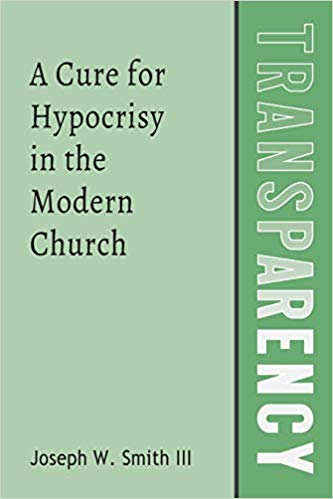
Joseph W. Smith III
Reviewed by: Timothy G. Herndon
Transparency: A Cure for Hypocrisy in the Modern Church, by Joseph W. Smith III. CreateSpace, 2018. Paperback, 324 pages, $14.99 (Amazon). Reviewed by OP pastor Timothy G. Herndon.
The modern church, just as the social milieu in which we live, is often beset with the desire to appear strong, put together, and generally successful in our spiritual lives even though the reality is far different. To maintain this façade, Christians adopt a “don’t ask—don’t tell” approach to life in the church. The result is that true fellowship in the church is stifled, and the life we are called to share together in the body of Christ seems remote. In Transparency: A Cure for Hypocrisy in the Modern Church, Joe Smith addresses this challenge.
Smith began to see the common thread of the lack of transparency in the life of the church in reflecting on his own experiences in small groups, where there ought to have been a measure of spiritual intimacy, as well as his service as a church officer (he is an elder at New Life OPC in Williamsport, Pennsylvania).
Smith describes transparency as that openness in our lives with one another in the church family—or “body,” as the apostle Paul says in 1 Corinthians 12— in which “we simply must take off the mask, drop the act, and let others see what’s really going on in our lives” (3). This transparency is rooted in the gospel; it speaks to who God is and who we are as his redeemed in Christ.
Drawing from Scripture and referencing a wide array of Christian and secular authors, Smith organizes his work in three major sections: barriers to transparency, reasons to cultivate transparency, and, finally, how to become transparent. He devotes half of the book to the final section, how to grow in gospel openness in the church. Each of the chapters, as well as an introduction and concluding section, contain a set of questions, helpfully assisting the reader to interact with the chapter’s subject matter. An experienced journalist and author, Smith’s writing is clear and easily accessible. He weaves into his writing from the very beginning the hope of the gospel. What could easily have felt simply like another call to be better and try harder instead is framed as an aspect of our sanctification in the life of the church, all of God’s grace: “Now I know in part; then I shall know fully, even as I have been fully known” (1 Cor. 13:12).
March 30, 2025
On the Trail with a Missionary
March 23, 2025
Midnight Mercies: Walking with God Through Depression in Motherhood
March 16, 2025
March 09, 2025
Zwingli the Pastor: A Life in Conflict
March 02, 2025
February 23, 2025
African Heroes: Discovering Our Christian Heritage
February 16, 2025
© 2025 The Orthodox Presbyterian Church